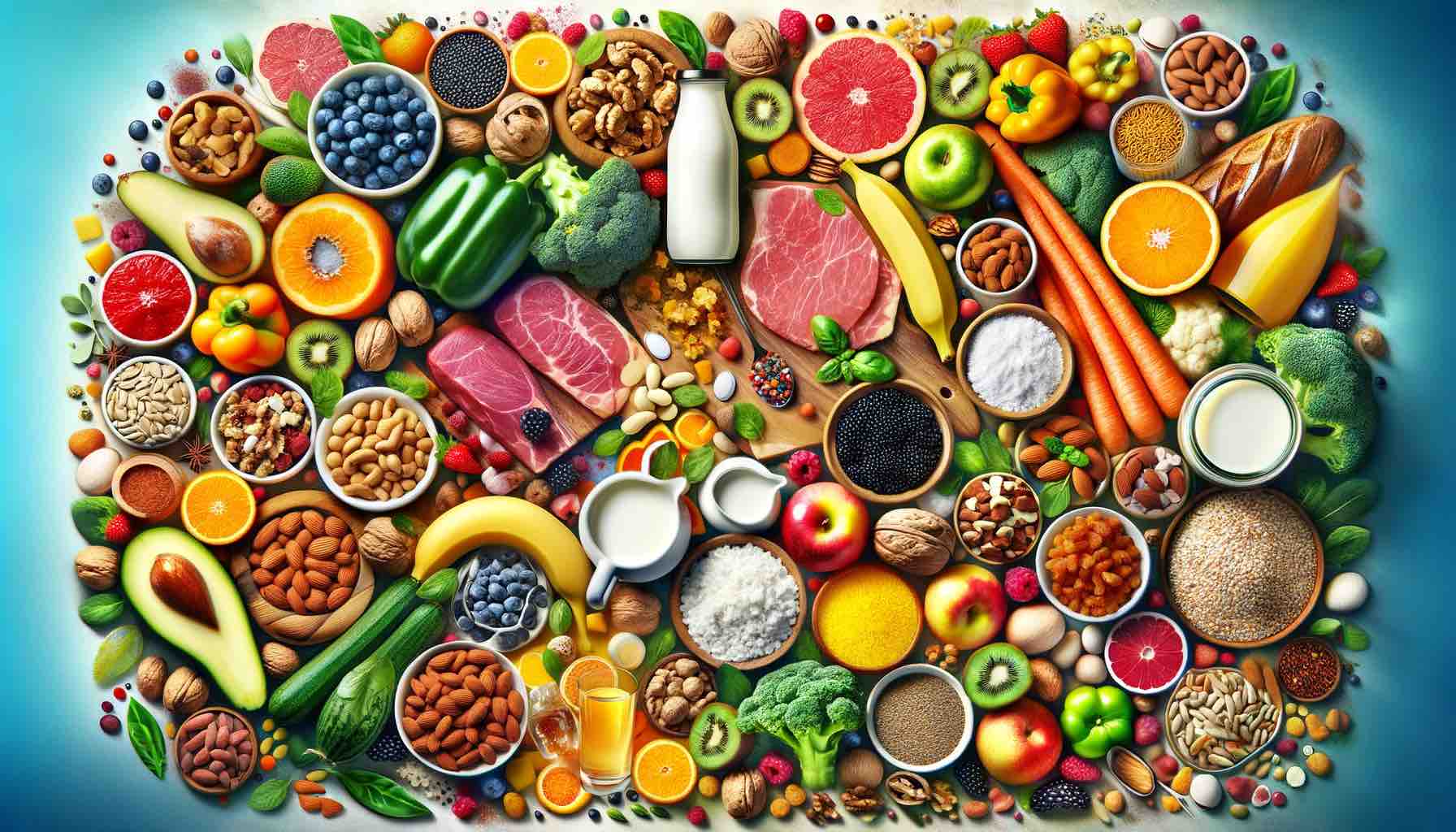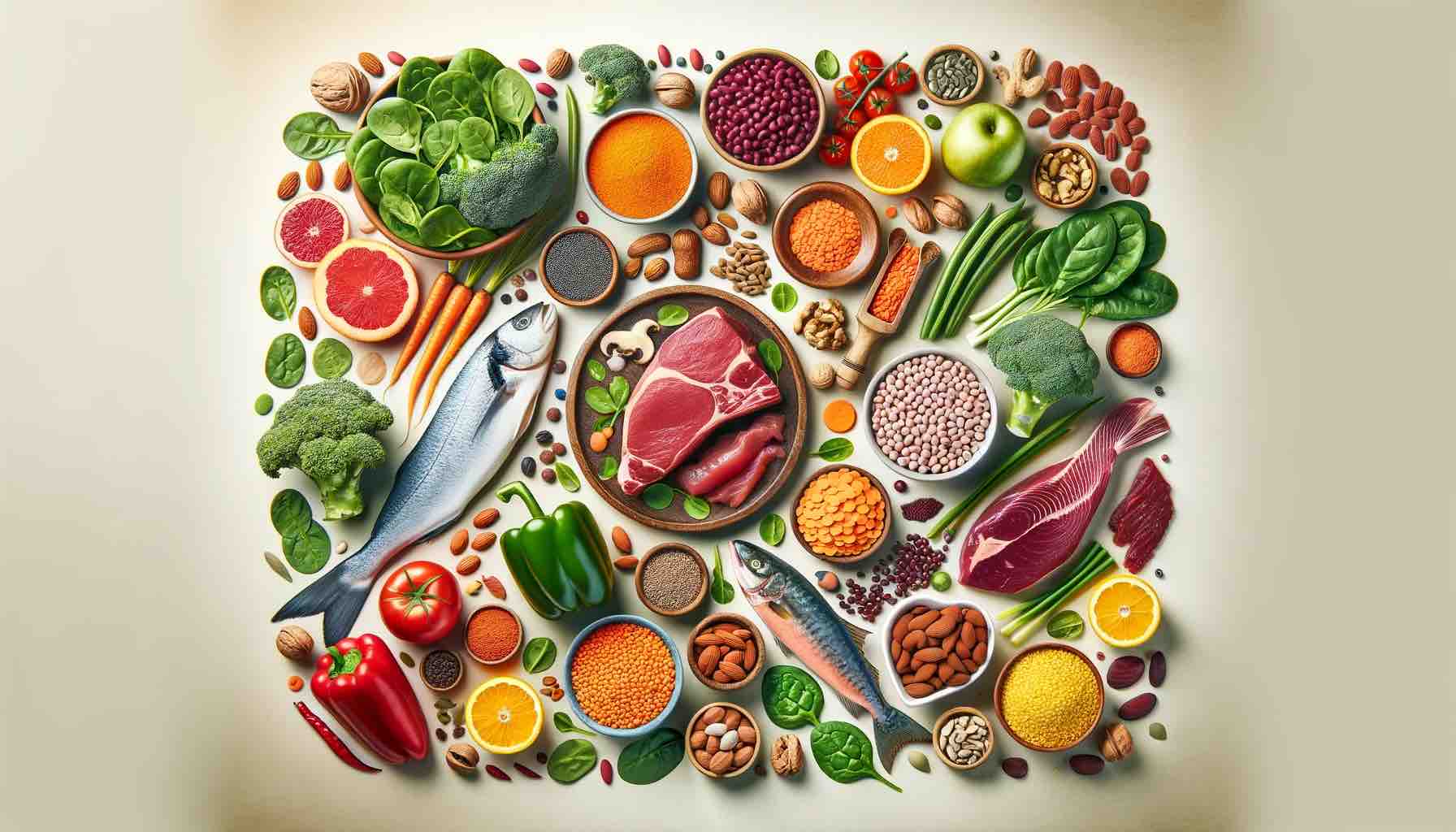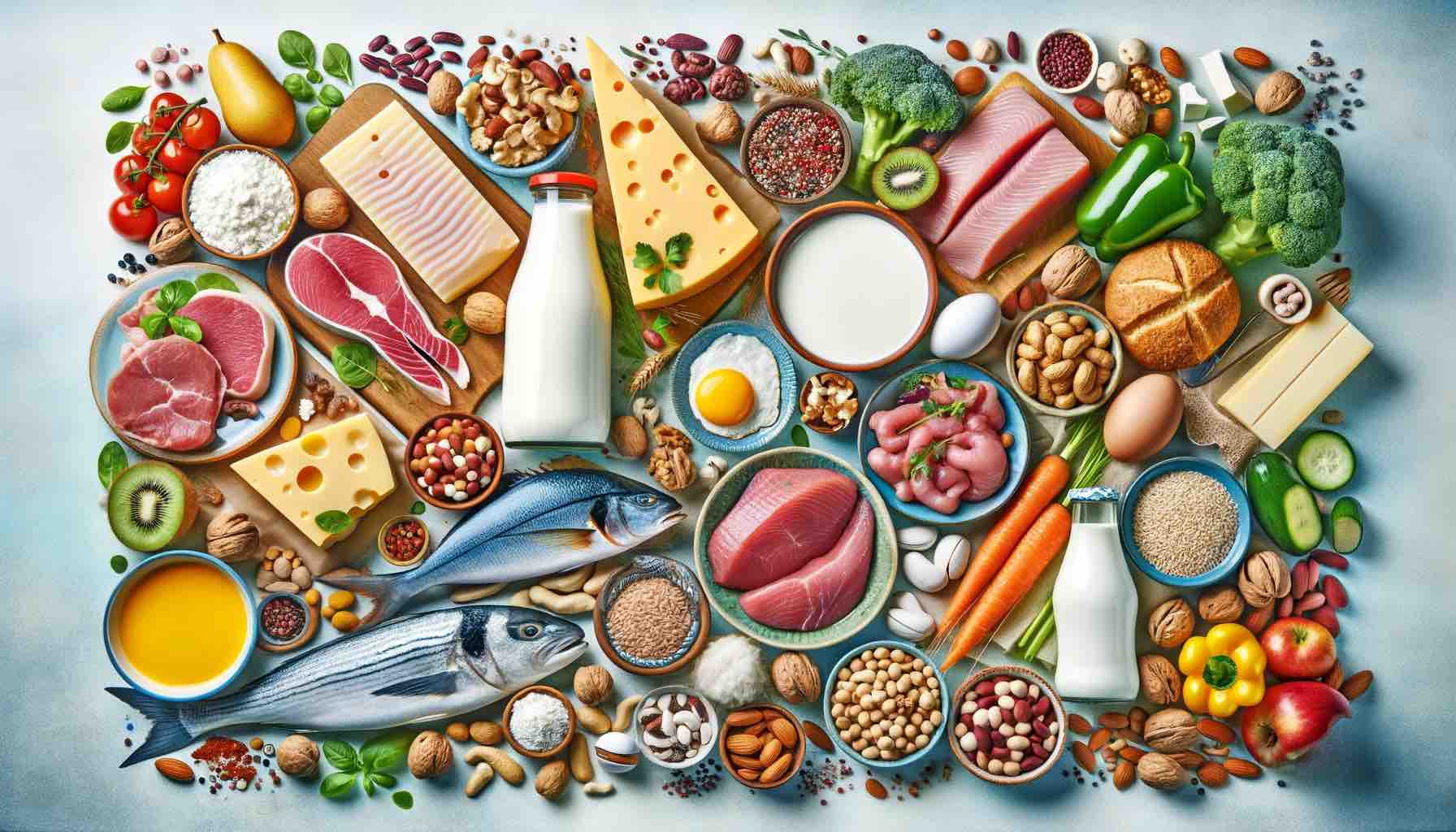
Introduction
Welcome to our comprehensive guide on minerals in food – a key series that will change the way you think about your daily diet. Have you ever wondered how these tiny elements in your food impact your overall health and well-being? Whether you’re a health enthusiast, someone curious about nutrition, or simply looking to improve your dietary habits, this series is for you.
Understanding Minerals: The Building Blocks of Health
When we hear “minerals,” we often think of the earth, rocks, or natural resources. But how often do we consider their indispensable role in our health? Minerals are more than just elements on the periodic table; they are essential components of our body’s daily functioning.
What Are Minerals?
Minerals are inorganic substances found in nature. Unlike vitamins and other nutrients, they are not produced by living organisms. Instead, they originate in the earth and water and are absorbed by plants or eaten by animals, making their way into our diet. Here are some key points about minerals:
- Natural Occurrence: They are found in nature, not made by humans.
- Never Alive: Unlike plants or animals, minerals have never been living organisms.
- Solid Form: Minerals are solid at room temperature and have a definite crystalline structure.
- Chemical Composition: Each mineral has a specific chemical composition and structure, making them unique in their properties and functions.
Major vs. Trace Minerals
Minerals in our diet can be categorized into two main groups: major minerals and trace minerals. The primary difference between these groups is the quantity required by our body.
- Major Minerals: These are needed in larger quantities (more than 100 mg/day). They include calcium, chloride, magnesium, phosphorus, potassium, and sodium. Each plays a significant role in maintaining our health, from building strong bones to regulating fluid balance.
- Trace Minerals: Required in smaller quantities (less than 100 mg/day), trace minerals are equally vital. This group includes elements like iron, zinc, copper, selenium, and iodine, each contributing to vital functions like oxygen transport, immune response, and thyroid health.
In the following sections, we will delve into the importance of these minerals, their specific roles in our health, and how we can ensure we’re getting enough of them through our diet. Stay tuned for a journey that will take you through the essentials of dietary minerals and how they contribute to a healthier you.
The Essential Role of Minerals in Our Health and Well-being
Why Minerals Matter in Your Diet
Minerals, though required in varying amounts, are pivotal for sustaining life. They are involved in almost every aspect of our body’s functioning, from building and maintaining strong bones to ensuring the proper functioning of the nervous and cardiovascular systems.
Minerals as Enablers of Bodily Functions
- Bones and Teeth: Minerals like calcium and phosphorus are not just building blocks for bones and teeth; they are also crucial for maintaining bone density and structural integrity as we age.
- Metabolic Processes: Minerals such as magnesium play a key role in energy production and enzyme activation. They are vital in converting food into energy, making them essential for all metabolic processes.
- Nervous System Function: Minerals like sodium, potassium, and calcium are key in transmitting nerve signals. Without them, our ability to move, think, and feel would be severely hampered.
- Muscle Function: Muscle contractions, a vital function for movement and heart health, rely heavily on minerals like magnesium and calcium.
- Balance of Fluids: Sodium and potassium work together to maintain the body’s fluid balance, which is critical for regulating blood pressure and overall cellular function.
The Impact of Mineral Deficiencies
A diet lacking in essential minerals can lead to various health problems, with some groups being more at risk, including the elderly, those with certain medical conditions, and pregnant women.
- Calcium Deficiency: A shortage can lead to weakened bones, heightening the risk of fractures and osteoporosis, especially in older adults.
- Iron Deficiency: This leads to anemia, characterized by fatigue, weakness, and impaired cognitive function, particularly common in women of reproductive age.
- Magnesium Deficiency: Symptoms include muscle cramps, mental disorders, irregular heartbeat, and increased susceptibility to chronic diseases such as type 2 diabetes and heart disease.
Major Minerals: The Pillars of Our Physical Health
In this section, we delve deeper into the major minerals, highlighting their unique roles and significance in maintaining our health.
Calcium: The Cornerstone of Bone Health
- Roles and Functions: Beyond bones, calcium is crucial for vascular contraction, muscle function, nerve transmission, and hormonal secretion.
- Dietary Sources: While dairy products are well-known calcium sources, leafy green vegetables, almonds, and fortified plant-based milks offer excellent non-dairy options.
Magnesium: The Multi-Tasking Mineral
- Roles and Functions: It aids in muscle and nerve function, regulates blood sugar levels, and supports the immune system and bone health.
- Dietary Sources: Rich sources include nuts, seeds, whole grains, leafy green vegetables, and legumes.
Potassium: Regulator of Cellular and Bodily Functions
- Roles and Functions: It is critical for maintaining fluid balance, transmitting nerve signals, and ensuring muscle contractions, including the heartbeat.
- Dietary Sources: Fruits like bananas, oranges, and apricots, vegetables like spinach and potatoes, and lean meats are great sources.
Sodium: More Than Just Salt
- Roles and Functions: Essential for fluid balance, nerve transmission, and muscle function. It’s vital to consume it in moderation.
- Dietary Sources: While it is abundant in table salt, it’s also present in vegetables, dairy products, and bread.
Chloride: Partner in Balancing Fluids
- Roles and Functions: It helps maintain fluid balance and is crucial for the production of digestive acids.
- Dietary Sources: Mostly consumed as table salt (sodium chloride), it’s also found in seaweed, rye, tomatoes, lettuce, and celery.
Phosphorus: The Energy Enabler
- Roles and Functions: Plays a key role in forming bones and teeth, and is essential for converting food into energy.
- Dietary Sources: Found in a wide range of foods, including dairy products, meat, fish, poultry, and whole grains.
In subsequent sections, we will further explore each of these minerals, including their specific health benefits, recommended intake levels, and how to incorporate them effectively into your diet for optimal health.
Trace Minerals: Small Quantities, Big Impact on Health
Trace minerals, required in smaller amounts than major minerals, are no less critical for our health. Their roles, though more specialized, are essential for various bodily functions.
Iron: Essential for Oxygen Transport and Energy
- Roles and Functions: Iron is a key component of hemoglobin, which transports oxygen in the blood. It’s also vital for energy production and immune function.
- Dietary Sources: There are two types of iron in foods – heme iron (found in animal foods like red meat, poultry, and fish) and non-heme iron (found in plant-based foods like lentils, beans, and fortified cereals).
Zinc: A Keystone for Immune Health and Wound Healing
- Roles and Functions: Zinc plays a crucial role in immune function, cell growth, and wound healing. It’s also important for taste and smell.
- Dietary Sources: Meat, shellfish, legumes, seeds, nuts, and dairy are good sources of zinc.
Selenium: Powerful Antioxidant for Thyroid and Overall Health
- Roles and Functions: Selenium is important for thyroid hormone metabolism, reproduction, DNA synthesis, and protecting the body from oxidative damage and infection.
- Dietary Sources: Brazil nuts, seafood, and organ meats are rich in selenium. Grains and other nuts also provide selenium, depending on the soil where they are grown.
Iodine: Critical for Thyroid Function and Development
- Roles and Functions: Iodine is essential for the production of thyroid hormones, which regulate metabolism. It’s particularly crucial for brain development during pregnancy and infancy.
- Dietary Sources: Iodine is commonly found in seaweed, fish, dairy products, and iodized salt.
Copper, Manganese, and Chromium: Supporting Metabolic Processes
- Roles and Functions: These trace minerals are involved in various metabolic processes. Copper aids in iron metabolism and energy production, manganese is important for bone formation and nutrient metabolism, and chromium helps regulate blood sugar levels.
- Dietary Sources: Nuts, seeds, whole grains, shellfish, and certain fruits and vegetables are good sources.
Balancing Your Mineral Intake: Practical Dietary Tips
Ensuring a balanced intake of both major and trace minerals is crucial for optimal health. Here are some practical tips to achieve this balance:
1. Diversify Your Diet
- Wide Range of Foods: Incorporate a variety of fruits, vegetables, whole grains, lean meats, dairy, and legumes into your diet. This ensures a broad spectrum of minerals.
- Colorful Plates: Eating different colored foods can also be a simple guide to getting a range of nutrients.
2. Consider Your Specific Needs
- Age, Gender, and Health Conditions: Your mineral needs can vary based on age, gender, and health conditions. For example, women may need more iron, while older adults might need more calcium and vitamin D.
- Consult a Dietitian: If unsure about your dietary needs, consulting a dietitian can be beneficial.
3. Beware of Over-Supplementation
- Supplements as a Secondary Option: Supplements can help when dietary intake is insufficient, but they shouldn’t replace a balanced diet. Excess intake of certain minerals can lead to health issues.
- Doctor’s Advice: Always seek a healthcare professional’s advice before starting any supplements, especially if you have health conditions or are on medication.
4. Cooking and Food Preparation
- Preserve Nutrients: Cooking methods like steaming and roasting can help preserve the mineral content of foods. Avoid overcooking vegetables to prevent nutrient loss.
- Whole Foods Over Processed: Opt for whole, minimally processed foods as processing can strip away valuable nutrients.
Recognizing Signs of Mineral Deficiencies
A balanced diet typically provides all the minerals your body needs. However, certain lifestyle factors and health conditions can lead to mineral deficiencies, which can have significant health impacts.
Key Signs of Deficiency
- Calcium Deficiency: Symptoms include muscle spasms, dry skin, brittle nails, and, in severe cases, osteoporosis.
- Iron Deficiency: Look for signs like fatigue, weakness, pale skin, and in severe cases, anemia.
- Magnesium Deficiency: Common indicators include muscle cramps, mental disorders, migraines, and increased risk of heart disease.
- Zinc Deficiency: Symptoms include weakened immune response, hair loss, and delayed wound healing.
- Iodine Deficiency: Can lead to goiter (enlarged thyroid gland), weight gain, and in pregnant women, developmental issues in babies.
Factors Contributing to Deficiencies
- Dietary Choices: A diet low in vegetables, fruits, whole grains, and lean proteins can lack essential minerals.
- Health Conditions: Certain conditions like digestive disorders can impair nutrient absorption.
- Lifestyle Factors: High stress, excessive alcohol consumption, and certain medications can also impact mineral levels.
The Risks of Excess Mineral Intake
While mineral deficiencies are a concern, excessive intake, especially from supplements, can be harmful.
Potential Health Risks
- Excess Iron: Can lead to liver damage, diabetes, and heart problems.
- Excessive Calcium: May result in kidney stones and impaired kidney function.
- High Sodium Intake: Linked to high blood pressure and heart disease.
Safe Supplementation
- Consult Healthcare Providers: Before starting any mineral supplements, especially if you have health conditions or are taking medications.
- Follow Recommended Dosages: Adhere to the recommended daily allowances and upper limits.
Conclusion: Empowering Your Health with Minerals
This series aims to empower you with knowledge about the critical role minerals play in your health. By understanding the importance, sources, and right balance of minerals, you can make informed dietary choices for a healthier life.
Call-to-Action: Join Our Mineral Nutrition Journey
Stay tuned for our upcoming posts, where we’ll explore each mineral in detail. We invite you to join us on this journey to better health. Subscribe to our series, share your thoughts in the comments, and let us know what specific topics you’d like us to cover in future posts.
Remember, your diet is a powerful tool in maintaining your health and well-being. Embrace the power of minerals and transform your health starting today!
FAQs
- What are the most important minerals for human health?
- The most important minerals include major minerals like calcium, magnesium, potassium, and trace minerals like iron, zinc, and selenium. Each plays a unique role in bodily functions, from building bones to supporting the immune system.
- Can you get all the necessary minerals from a vegetarian diet?
- Yes, a vegetarian diet can provide all necessary minerals. Plant-based sources like leafy greens, nuts, seeds, and legumes are rich in minerals like iron, magnesium, and calcium. However, careful planning may be needed to ensure adequate intake.
- How does mineral deficiency affect the body?
- Mineral deficiencies can lead to various health problems. For instance, calcium deficiency can weaken bones, iron deficiency can cause anemia, and zinc deficiency can impair immune function.
- Are mineral supplements necessary if I eat a balanced diet?
- If your diet is well-balanced and diverse, you may not need supplements. However, some people with specific health conditions or dietary restrictions might benefit from supplementation, as advised by a healthcare provider.
- What are the risks of consuming too much of a mineral?
- Excessive intake of minerals, usually through supplements, can lead to health issues. For example, too much iron can cause liver problems, and excess calcium can lead to kidney stones.
- How can I tell if I’m getting enough minerals in my diet?
- Observing your overall health and well-being is a good start. Symptoms like fatigue, weak bones, or frequent illness can indicate a deficiency. For precise assessment, consulting a healthcare professional and getting blood tests can be helpful.
- Which foods are the best sources of minerals?
- Dairy products, leafy greens, nuts, seeds, whole grains, lean meats, and seafood are excellent sources. A varied diet usually covers the spectrum of necessary minerals.
- Can children and adults have different mineral requirements?
- Yes, children and adults have different mineral requirements. Children need more of certain minerals for growth and development, while adults may need more to maintain health and prevent chronic diseases.
- What is the role of minerals in managing chronic diseases?
- Minerals play a vital role in managing chronic diseases. For example, magnesium can help regulate blood pressure, and calcium is essential for bone health, especially in conditions like osteoporosis.
- How does mineral intake affect athletic performance?
- Adequate mineral intake is crucial for athletes. Minerals like potassium and sodium are essential for fluid balance and muscle function, while iron is vital for oxygen transport during physical activity.
Blog Tags for the Post:
nutrition, minerals in diet, health and wellness, balanced diet, dietary supplements, mineral deficiency, healthy eating, vegetarian sources of minerals, chronic disease management, athletic performance nutrition













